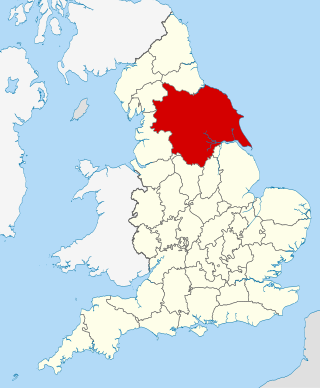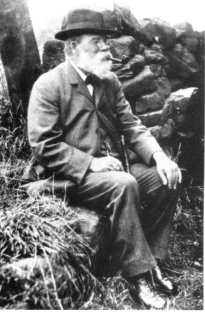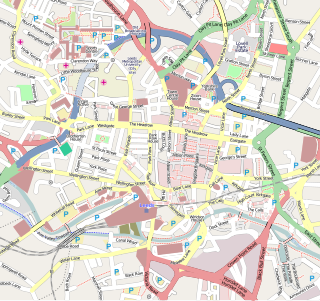Related Research Articles

Rothwell is a town in the south-east of the City of Leeds metropolitan borough in West Yorkshire, England. It is situated between Leeds and Wakefield.

Shipley is a historic market town and civil parish in the City of Bradford, West Yorkshire, England, by the River Aire and the Leeds and Liverpool Canal, north of Bradford. The population of the Shipley ward on Bradford City Council taken at the 2011 Census was 15,483.

Yeadon is a town within the metropolitan borough of the City of Leeds, West Yorkshire, England.

The Yorkshire dialect is a dialect of English, or continuum of dialects, spoken in the Yorkshire region of Northern England. The dialect has roots in Old English and is influenced by Old Norse. The Yorkshire dialect has faded and faces extinction, but organisations such as The Yorkshire Dialect Society and the East Riding Dialect Society exist to promote its use.

Hunslet is an inner-city area in south Leeds, West Yorkshire, England. It is 1 mile (1.6 km) southeast of the city centre and has an industrial past.

The Leeds Rhinos are a professional rugby league club in Leeds, West Yorkshire, England. The club was formed in 1870 as Leeds St John's and play in the Super League, the top tier of English rugby league. They have played home matches at Headingley Stadium since 1890.

Headingley Stadium is a stadium complex in Headingley, Leeds, West Yorkshire, England, comprising two separate grounds, Headingley Cricket Ground and Headingley Rugby Stadium, linked by a two-sided stand housing common facilities. The grounds are the respective homes of Yorkshire County Cricket Club and Leeds Rhinos Rugby League Club.
Clive Upton is an English linguist specializing in dialectology and sociolinguistics. He is also an authority on the pronunciation of English. He has been Emeritus Professor of Modern English Language at the University of Leeds since 2012.
The loins, or lumbus, are the sides between the lower ribs and pelvis, and the lower part of the back. The term is used to describe the anatomy of humans and quadrupeds, such as horses, pigs, or cattle. The anatomical reference also applies to particular cuts of meat, including tenderloin or sirloin steak.


Joseph Wright FBA was an English Germanic philologist who rose from humble origins to become Professor of Comparative Philology at the University of Oxford.


Leeds city centre is the central business district of Leeds, West Yorkshire, England. It is roughly bounded by the Inner Ring Road to the north and the River Aire to the south and can be divided into several quarters.

Loidis, from which Leeds derives its name, was anciently a forested area of the Celtic kingdom of Elmet. The settlement certainly existed at the time of the Norman conquest of England and in 1086 was a thriving manor under the overlordship of Ilbert de Lacy. It gained its first charter from Maurice de Gant in 1207 yet only grew slowly throughout the medieval and Tudor periods. The town had become part of the Duchy of Lancaster and reverted to the crown in the medieval period, so was a Royalist stronghold at the start of the English Civil War.

The Survey of English Dialects was undertaken between 1950 and 1961 under the direction of Professor Harold Orton of the English department of the University of Leeds. It aimed to collect the full range of speech in England and Wales before local differences were to disappear. Standardisation of the English language was expected with the post-war increase in social mobility and the spread of the mass media. The project originated in discussions between Professor Orton and Professor Eugen Dieth of the University of Zurich about the desirability of producing a linguistic atlas of England in 1946, and a questionnaire containing 1,300 questions was devised between 1947 and 1952.
The English language spoken and written in England encompasses a diverse range of accents and dialects. The language forms part of the broader British English, along with other varieties in the United Kingdom. Terms used to refer to the English language spoken and written in England include: English English and Anglo-English.

The Calls is an area and street by the River Aire in Leeds city centre, West Yorkshire, England. This district falls within the City and Hunslet ward of the City of Leeds Council. Formerly an area of industry in Leeds, it has now been regenerated with a mixture of uses: primarily offices, residential and leisure.
Smoggie is a colloquial term used to refer to people from the Teesside area of North East England. The term is also used to describe the local accent and dialect spoken in the area. The origin of the term dates back to the 1960s, when the area was known for its high levels of pollution from local industry, which resulted in a thick smog that often blanketed the region. Visiting football supporters from other areas of the country began to refer to the locals as "smog monsters", which was later shortened to "smoggies". Despite its origins as a term of derision, "Smoggie" has since been adopted as a term of pride by many residents of Teesside.
The battle of Leeds took place during the First English Civil War on 23 January 1643, when a Parliamentarian force attacked the Royalist garrison of Leeds, Yorkshire. The attack was partly dictated by the need to maintain local support for the Parliamentarian cause; the Earl of Newcastle had recently shifted the balance of power in Yorkshire in the Royalists' favour with the addition of his 8,000-strong army, and sent one of his commanders, Sir William Savile to capture Leeds. The West Riding of Yorkshire relied on the cloth trade, and Ferdinando, Lord Fairfax sent his son, Sir Thomas Fairfax to bolster the defences of nearby Bradford, before agreeing to his request to attack Leeds.
LGBT culture in Leeds, England, involves an active community of people who identify as lesbian, gay, bisexual, or transgender/transsexual. A BBC News Online article published in 2012 stated that, while Leeds City Council has not published statistics relating to the number of LGBT residents, the figure can be estimated at 10% of the overall population, which currently suggests a total of at least 77,000. The tenth year of the Leeds Pride march and celebration, held in 2016, was attended by over 40,000 people.
References
- ↑ Smith, Peter (11 May 2015). "Leeds Rhinos Flashback: Loiners come back from the dead to beat Saints and retain the Cup". Yorkshire Evening Post .
- ↑ "LEEDS AND WEST YORKSHIRE". www.englandsnortheast.co.uk. Retrieved 12 November 2018.
- ↑ "Loiners of the world unite!". BBC voices2005. 24 September 2014. Retrieved 12 November 2018.
- ↑ Wright, Joseph (1902), The English Dialect Dictionary, being the complete vocabulary of all dialect words still in use, or known to have been in use during the last two hundred years; founded on the publications of the English Dialect Society and on a large amount of material never before printed, Volume 3 H-L